
 Flash News
Flash News
Korça/ 40-year-old man jumps from fifth floor balcony, in critical condition
Croatia restores compulsory military service
Illegal constructions in Theth, Manja demands disciplinary proceedings against prosecutor Elsa Gjeli
Details from the murder of Renis Dobra, the perpetrators came with 2 Range Rover cars from Rrëshen
The Supreme Court left him in prison, Meta addresses the 'Constitution'

After winning a landslide victory for his fourth term, Prime Minister Edi Rama returned to his favorite action this early July: he promised a national campaign to liberate public spaces.
The action was launched by the Municipality of Vlora after a closed-door meeting on July 3, where Rama blamed local officials for a number of problems, including the occupation of public spaces by tents, umbrellas, and chairs from bars and restaurants.
Afterwards, the National Inspectorate for Territorial Protection, IKMT, landed in the Albanian Alps in Theth to demolish several wooden cabins placed without permission, while Rama called a Shkodra prosecutor into battle, whom he blamed for closing the investigation against the abusers.
This is not the first time that Rama has promised to establish the rule of law on the territory through actions, which in the past have yielded controversial results.
In August 2013, when he was newly elected prime minister, Rama declared a national emergency to clean up the coast from illegal construction. Another similar campaign was repeated after winning the 2021 elections, entitled “Our Coast,” where Rama promised to demolish illegal constructions and bring those responsible to justice.
In the fall of 2022, Rama's government issued a normative act for the confiscation of unauthorized additions to Tirana's tower blocks. But a year and a half later, the government returned the buildings to the lawbreakers at prices 10 times lower than the market value.
Governance through 'actions' can be called a distinctive feature of Rama's government, which, according to experts, has shown in the past a lack of results and systemic failure of institutions.
For Zef Preçi, director of the Institute for Economic Studies, the latest action confirms the “spectacular failure of the system” built by Rama during his 12 years in power. Preçi recalls that the government pays an army of civil servants and public officials, while the sidewalks are occupied by businesses – often through “under the table” payments.
"The end of the next action is more or less known, just as the action against informality, illegal water and electricity connections, or the action against gambling, the reorganization of inspectorates, including those of the coast, the National Employment Agency, etc., ended in a flash," warns Preçi.
Doriana Musai, architect and activist, also believes that the government's new action is just another show that makes noise but does not address the problem.
“The problem is not solved by seasonal government decisions, much less by top-down orders from a single person,” Musai told BIRN.
"Instead of holding the authorities in control of the territory accountable, this responsibility tends to be distributed 'to everyone and to no one,'" Musai added - while emphasizing that in the end the loser will once again be the public.
Legal occupation, a bigger problem
The abuse of territory through unauthorized construction has been a systemic problem in transitional Albania, and yet, experts say that public properties in Albania are facing a greater threat – that of illegal occupation.
To illustrate this fact, Preçi mentions construction in major cities as well as strategic investments on the coast, which are made with the government's blessing.
He emphasizes that actions ordered by Rama without taking institutional responsibility for the illegalities are a populist behavior that hides the real problem of the government's illegal occupation of public property.
“In fact, the real concern of citizens is related to the permanent occupation by construction in both the main cities and the southern coast, for which Mr. Rama and his establishment have no answer and by making noise in distant Thethi, they shift attention from the aggression of business lobbies, the oligarchy and organized crime in the most favored parts of the country’s territory,” Preçi told BIRN.
Doriana Musaj also sees Rama's latest action as an attempt to hide the real problem facing public property, which is its destruction by law. According to her, instead of protecting these common assets, the government has turned them "into private goods for clientelistic interests and development propaganda."
"The government itself has been the main promoter of the usurpation of public lands, granting permits for massive construction in parks, seashores, protected areas and even in historical centers," Musai tells BIRN.
In this context, Musai emphasizes that the problem with bar chairs and umbrellas is only the "tip of the iceberg." /BIRN
Latest news


Malltezi: SPAK admits, we are in a process that began with Balla's false report
2025-07-10 22:34:16

Si të çliroheni nga bllokimet emocionale me anë të ushtrimeve
2025-07-10 21:57:24

Lala: Veliaj wanted to return as mayor
2025-07-10 21:40:46

VIDEO/ Brawl in Bolivian parliament, deputies physically clash
2025-07-10 21:20:30


Albania experienced one of the longest heat waves of the last decade
2025-07-10 21:01:09

The Government approves new procedures for declaring residence in e-Albania
2025-07-10 20:39:32

Koka: Northerners will not forget Edi Rama's racist operation in Theth
2025-07-10 20:18:24
The 3 zodiac signs that will be most affected by the 'Full Moon' of July 10
2025-07-10 20:04:49
New director of the National Center of Cinematography appointed
2025-07-10 19:51:12
Korça/ 40-year-old man jumps from fifth floor balcony, in critical condition
2025-07-10 19:40:19
'Tired Woman'/ The Syndrome That Affects Thousands of Women Every Day
2025-07-10 19:34:02
Jane Birkin's original Hermès bag sells for $10 million
2025-07-10 19:26:22

Britain-Ukraine agreement signed for 5,000 Thales missiles
2025-07-10 19:00:25
Fire in Zvërnec, flames endanger two hotels
2025-07-10 18:57:19
Croatia restores compulsory military service
2025-07-10 18:39:01
Spahia: The great truth of the strong accusation of the residents of Theth
2025-07-10 18:35:07


The Supreme Court left him in prison, Meta addresses the 'Constitution'
2025-07-10 17:57:21
New punishment with 'new' regulations
2025-07-10 17:54:46
EU translator fired over fears for Zelenskyy's safety
2025-07-10 17:45:37
'You are a policeman, but not God, take my soul', protest for Agon Zejnullahu
2025-07-10 17:41:21


Video/ Rama repeats the scenario, kneels before Meloni again
2025-07-10 16:56:31
He set fire to a plot of olive trees, 50-year-old man arrested in Shijak
2025-07-10 16:46:19

Rubio: US and Russia have exchanged new ideas for Ukraine peace talks
2025-07-10 16:36:20
Death of 27-year-old, Lipjan Police Commander Resigns
2025-07-10 16:21:28
Video/ An apartment burns in Tirana near the New Bazaar
2025-07-10 16:09:36


Jensila lights up the internet with her birthday greetings to Ledri
2025-07-10 15:42:08
They're full of pesticides! List of 12 products we need to be careful of
2025-07-10 15:31:04

Worker falls from scaffolding in Shëngjin, urgently sent to Trauma
2025-07-10 15:11:03
Malltezi: Within one day they seized my accounts, properties and shares
2025-07-10 15:01:23
EU: Israel has agreed to more aid to Gaza
2025-07-10 14:55:19

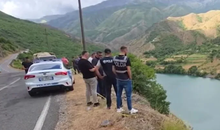
Murder of Reni Dobra, 23-year-old's vehicle pulled from the water
2025-07-10 14:29:23
Trump's tariffs on Brazil raise coffee prices
2025-07-10 14:16:07
Ursula von der Leyen survives no-confidence vote
2025-07-10 14:04:27

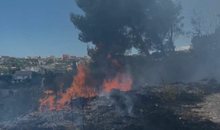
Fire in Lezha, flames near electrical substation
2025-07-10 13:32:24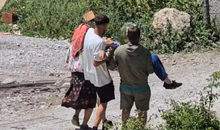
Residents clash with police in Theth, a woman faints
2025-07-10 13:24:38
"Rama and Xanun"
2025-07-10 13:15:46

Zodiac signs most likely to get divorced in July 2025
2025-07-10 12:45:51
A scapegoat for an illegitimate Republic
2025-07-10 12:35:02
"He has devastated his own nation"/ Berisha: Rama imprisons his opponents!
2025-07-10 12:26:54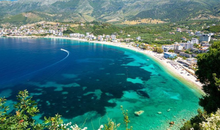

Albanian man injured with knife in Italy
2025-07-10 12:08:55






23-year-old in Mat drowned with rope, 4 suspects are being held
2025-07-10 10:58:53
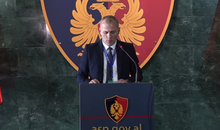
After the dismissals, the new director of the Shkodra Police is appointed
2025-07-10 10:30:10
BIRN: Rama's action for public spaces, a repeated spectacle
2025-07-10 10:29:11
Action in Theth, Shkodra Police leaders dismissed
2025-07-10 10:16:28
Fatal accident on the Tirana-Durres highway
2025-07-10 10:01:58
The incinerator does not exist, but the government continues to increase funds
2025-07-10 09:51:45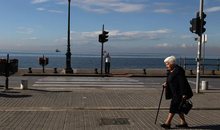
Albania is aging at a rapid pace! 30% of the population is over 60 years old
2025-07-10 09:46:23
End of an era, Modric says 'goodbye' to Real Madrid
2025-07-10 09:36:09
Mount Dukat has been on fire for 6 days, residents request air intervention
2025-07-10 09:27:24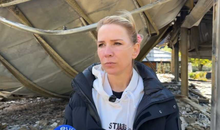

"Poverty on the rise"/ DW: Many people in Germany are not getting paid
2025-07-10 09:08:06
Horoscope, what do the stars have in store for you today?
2025-07-10 08:51:59

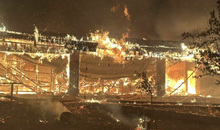
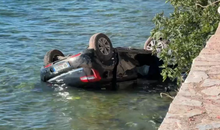

The scorching heat returns, the thermometer climbs to 40°C
2025-07-10 07:58:52
Morning Post/ In 2 lines: What mattered yesterday in Albania
2025-07-10 07:46:35
Tourist operator in Theth: They are demolishing our houses without warning
2025-07-09 22:54:57

Trump and Israeli commander warn: Gaza ceasefire could be near
2025-07-09 22:13:21
Fire in Elbasan Landfill, pedagogue: It is a cancer and environmental crime
2025-07-09 21:54:47


Dangerous summer, number of snake bites increases
2025-07-09 21:22:13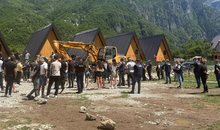
Berisha appeals again: Stop state terror against the residents of Theth!
2025-07-09 21:15:36
'Kissing disease' virus linked to several forms of cancer
2025-07-09 21:04:44
Malltezi confesses after release: Justice has become a political weapon
2025-07-09 20:51:48
Vokshi: Albania's EU integration has stalled due to lack of free elections
2025-07-09 20:37:21
